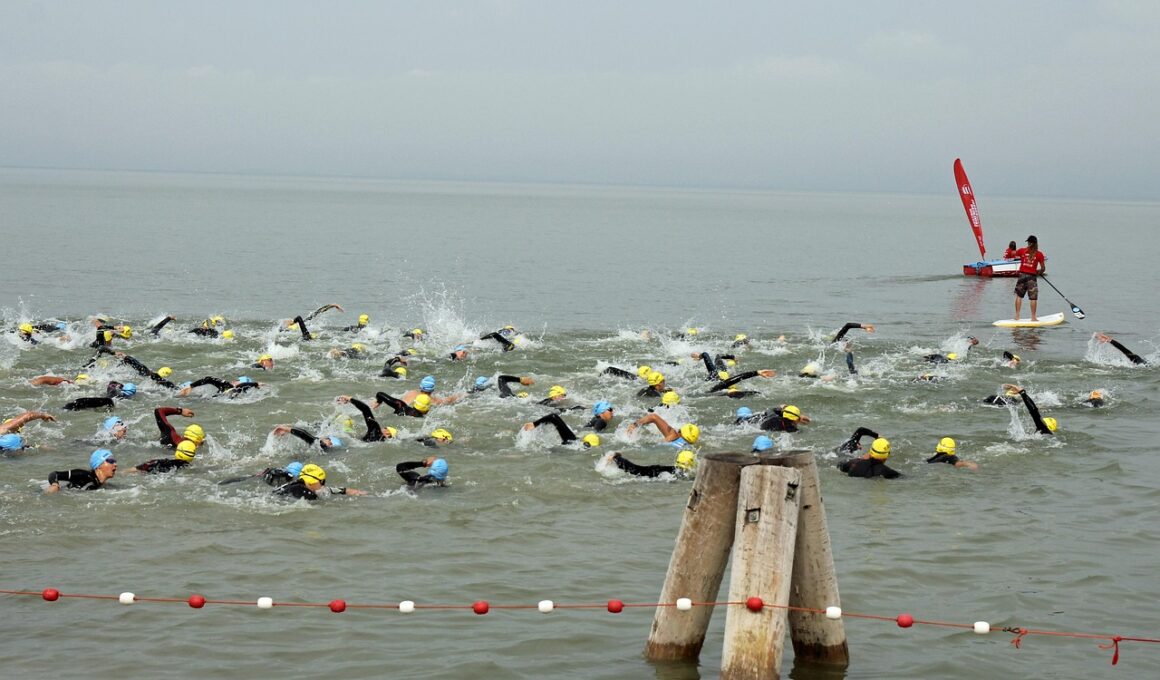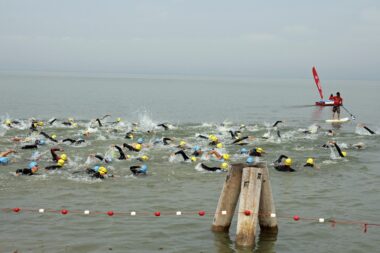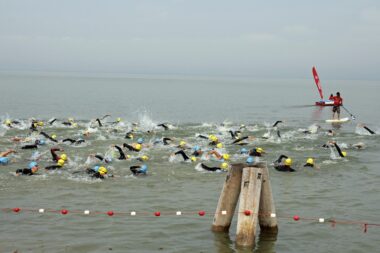Understanding the Physiology of Cold Water Swimming
Cold water swimming, often referred to as an invigorating and challenging activity, significantly impacts the physiology of the human body. The body responds to lower temperatures by increasing metabolic rates, enabling swimmers to maintain body heat. This phenomenon is crucial for survival and enhances endurance. As swimmers immerse themselves in cold water, several physiological changes occur. One notable change involves vasoconstriction, reducing blood flow to extremities, which helps preserve core body temperature. Additionally, the release of adrenaline can improve mood and mental focus. Swimmers also perceive a heightened sense of alertness, which is partly due to the hormonal responses to cold exposure. Moreover, the cardiovascular system works harder, promoting better circulation and heart health. Cold water swimming has been shown to improve lung capacity, raised heart rates, and overall fitness levels. These adaptations not only support better overall wellness but also foster resilience in the face of distress. By regularly practicing cold water swimming, individuals can experience these collective benefits, ultimately supporting physical and mental well-being in a remarkable way. Overall, cold water swimming represents an area rich with physiological considerations that continue to intrigue researchers worldwide.
The Benefits of Cold Water Exposure
Engaging consistently in cold water swimming presents numerous benefits associated with the practice. Firstly, exposure to frigid temperatures promotes improved blood circulation, enhancing cardiovascular health. The pumping action of the heart increases as it works to send blood to vital organs and tissues, resulting in more efficient oxygen delivery. Secondly, it boosts the immune system, as regular exposure to cold water trains the body to adapt, producing higher levels of white blood cells. Additionally, cold water swimming can significantly elevate mood through endorphin release, making participants feel invigorated and energized. This uplifting effect is particularly beneficial for those struggling with anxiety or depression. Moreover, swimming in cold water can improve metabolic function as the body seeks to generate heat, thus burning more calories during and after the activity. Another noteworthy advantage is the potential for improved mental toughness; embracing the discomfort of cold swimming fosters resilience. Some studies suggest that consistent exposure might even help with better sleep quality. Therefore, the myriad benefits of cold water swimming justify its growing popularity among athletes and adventurers alike, as well as casual enthusiasts.
One of the most interesting aspects of cold water swimming is the body’s acclimatization process. As swimmers frequently expose themselves to cold conditions, physiological adaptations occur, increasing tolerance to lower temperatures. This adaptation entails increased insulating fat storage known as brown fat, contributing to heat generation within the body. Over time, swimmers also develop a remarkable ability to maintain performance levels despite cold exposure. The physiological adaptations include altered responses to muscle fatigue and changes in nerve activity that improve performance. Additionally, cold exposure is linked to enhanced recovery benefits, as swimming in cold water can reduce inflammation and alleviate muscle soreness. Consequently, athletes often embrace this practice as part of their training regimen. Furthermore, the psychological aspect of acclimatization can’t be ignored; swimmers commonly find themselves developing greater confidence and determination. Enhanced mental fortitude accompanies the physical adaptations, equipping individuals with the strength necessary to face various challenges. The process of acclimatizing to cold elements indeed cultivates not only physical resilience but also emotional growth and self-awareness through the experience of cold water swimming.
Thermoregulation and Cold Water Swimming
Thermoregulation plays a vital role in cold water swimming, where maintaining core body temperature becomes essential. While swimming, the body encounters substantial heat loss due to the lower temperatures of the water compared to the human body. To counteract this, thermoregulatory responses kick in, such as shivering to produce warmth and increased heart rate. When submerging oneself in cold water, the body initially struggles to adapt, resulting in the shocking effects of the cold on skin receptors. Swimmers may experience a sense of hyperventilation due to the rapid changes in temperature. However, with regular practice, individuals often develop coping mechanisms, enabling better thermal balance and reducing shock. Furthermore, one fascinating physiological response is the involuntary breath-holding reflex, which can increase swim efficiency by maintaining buoyancy. Proper acclimatization improves the swimmer’s abilities to manage stressors associated with temperature changes. As swimmers navigate cold water environments, thermoregulation becomes a continuous adjustment process. Thus, understanding the intricate relationship between thermoregulation and cold swimming enables individuals to optimize their experiences in challenging aquatic situations more effectively.
In addition, the psychological benefits of cold water swimming should not be underestimated. Constantly exposing oneself to cold has been associated with building mental resilience. Many practitioners find that the experience grants them a stronger mindset, allowing them to confront not only the challenges of swimming but also various aspects of life. The adrenaline rush caused by the initial shock of cold water can enhance mental clarity, leading to improved focus and determination. Swimmers often report feelings of euphoria, attributed to endorphin release following immersion in frigid conditions. Furthermore, incorporating mindfulness practices while swimming can amplify the benefits, enhancing mental well-being. This combination proves especially useful for those battling anxiety, depression, or stress. Daily swimming rituals often lead to improved self-esteem, as participants become proud of their ability to tackle discomfort. Ultimately, the psychological transformation occurring through cold water swimming encourages individuals to challenge their limits, fostering personal growth. Each swim has the potential to teach valuable lessons regarding strength, courage, and conquering fear, showcasing the positive impact of embracing discomfort in daily life.
Safety Considerations for Cold Water Swimmers
Understanding safety considerations is critical for those venturing into cold water swimming. Starting with gradual exposure is essential to allow the body to adapt and build tolerance. Sudden immersion in frigid water can lead to serious conditions such as hypothermia or cold water shock, which pose significant health risks. Swimmers must wear proper attire, such as neoprene wetsuits, to maintain warmth and minimize heat loss. Additionally, educating oneself about swimming conditions and potential hazards proves invaluable—being aware of currents, tides, and water temperature can impact safety significantly. It’s also advisable to swim with a buddy or in organized groups, ensuring support during unforeseen circumstances. Practicing safe entry and exit methods, along with establishing a clear swimming plan, allows for an enjoyable experience. Furthermore, recognizing the signs of hypothermia—such as uncontrollable shivering, fatigue, or lack of coordination—is vital for immediate intervention to prevent harm. Lastly, warm-up practices after swimming, such as dry clothing or hot beverages, help the body return to a normal temperature. By prioritizing safety, swimmers can enjoy cold water swimming while minimizing risks associated with the activity.
In conclusion, cold water swimming encompasses an exciting combination of physiological adaptations, mental fortitude, and safety measures. By embracing this invigorating practice, individuals may unlock numerous benefits, such as enhanced physical fitness and psychological resilience. The body’s ability to withstand lower temperatures improves metabolic processes, promoting overall health. Likewise, the mental aspects of this experience contribute to improved focus, confidence, and determination. Safety remains a paramount concern, ensuring that swimmers can enjoy the numerous advantages without compromising well-being. As interest in cold water swimming continues to grow, understanding its intricacies becomes increasingly important for enthusiasts and researchers alike. The shared community surrounding cold water swimming fosters connections and support, making the journey even more rewarding. Thus, as people venture into chilly waters, they discover not only the physical challenges but also emotional and psychological transformations that accompany the experience. Cold water swimming ultimately represents a journey of self-discovery, teaching valuable lessons in resilience and the importance of embracing discomfort in the pursuit of well-being, ultimately creating lasting memories in the process.
In closing, as you embark on your journey in cold water swimming, remember to listen to your body, respect its responses, and adapt gradually. This activity not only enhances your physical health through effective adaptation to colder climates but also strengthens your mental resilience over time. As you conquer the shock of cold water, you’ll find yourself transforming into a more robust, confident individual. Building a community of fellow cold water swimmers can foster connections that make your experience fulfilling and enjoyable. Seek resources, such as local clubs, to engage with like-minded individuals who can share tips, stories, and encouragement. Recognizing your limits and celebrating your achievements will enhance your progress, making cold water swimming not just a sport but a lifestyle choice. Take your time to explore various cold water swimming locations, embracing the beauty of nature while reaping the myriad advantages offered by the experience. Challenge yourself to swim in different environments, such as lakes or the ocean, and discover your thresholds of comfort. Ultimately, cold water swimming can gift you with lasting memories and profound personal growth as you embrace the journey.





